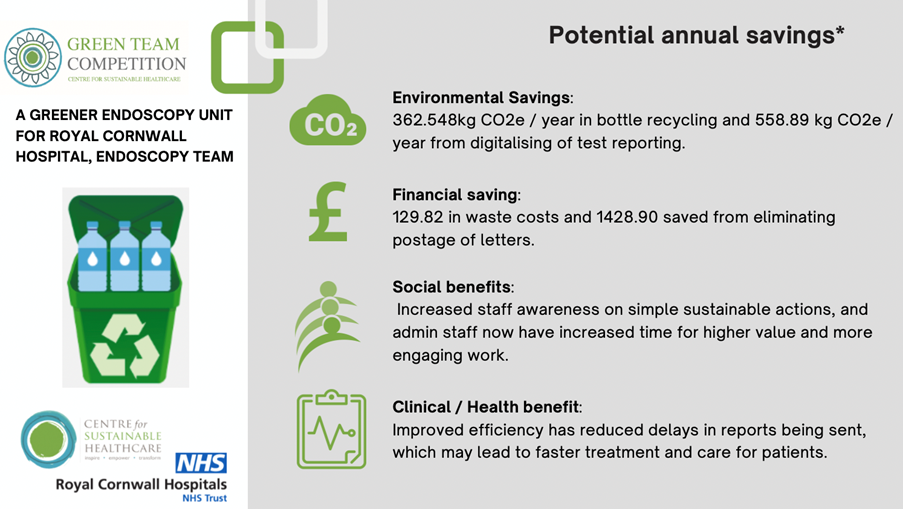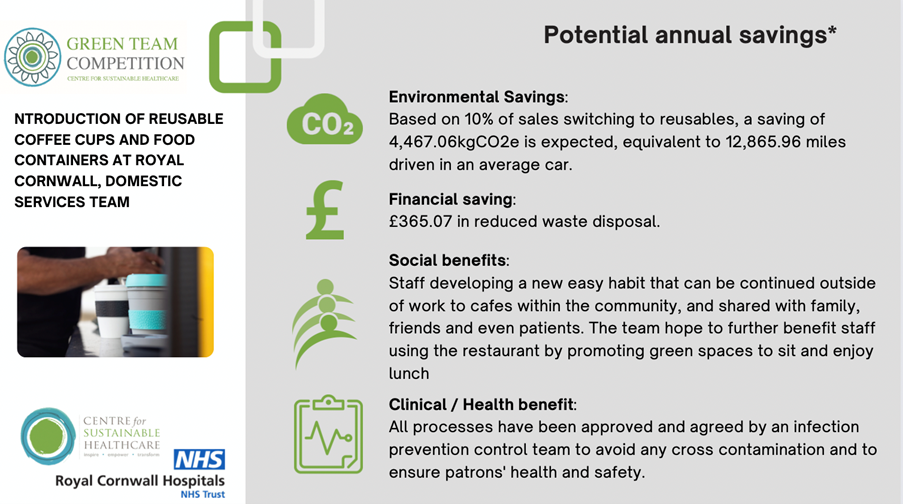
Royal Cornwall Hospitals NHS Trust Green Team Competition - 3 teams anticipate an annual reduction of 6,185kg CO2e!
This year, three teams from the Royal Cornwall Hospitals NHS Trust (RCHT) participated in the Green Team Competition, a clinical leadership and engagement programme for NHS Trusts to improve their sustainability within their services.
Climate change has far-reaching impacts on global health. Whilst healthcare systems have a key part to play in maintaining health in the face of the threat of climate change, the delivery of healthcare is also undermining the health of our populations by contributing to the problem. If healthcare were a country, it would be the 5th largest carbon emitter in the world. It is estimated that the England health and care system accounts for 4-5 % of the country's carbon footprint.
In 2019/20, Cornwall and the Isles of Scilly Health and Care Partnership system-wide carbon footprint was 329,170 tonnes of carbon dioxide emissions. Since the baseline year of 2016/17, our organisations have been successful in reducing emissions by 24%. The Green Team Competition aims to further engage staff to support RCHT in enhancing sustainable use of resources and innovating sustainable models of care. The three teams who took part in the Green Team Competition received mentoring from the Centre for Sustainable Healthcare (CSH) to develop, run and measure projects that add sustainable value within their service, by considering the ‘triple bottom line’ of reduced environmental harm, reduced financial waste, and adding social value.
At the July 19th Judging and Awards Ceremony, the three teams presented their projects, including the anticipated savings and opportunities to scale and spread. The judging panel consisted of Ella Stracey, Deputy Director of Strategy and Performance at Royal Cornwall Hospitals NHS Trust, and Catherine Floyd, Clinical Specialities Lead at the Centre for Sustainable Healthcare.
The combined projects of the three Green Team Competition teams have projected annual savings of £3,289.43 and 6,185 kgCO2e.

Team 1: A Greener Endoscopy Unit for Royal Cornwall Hospital, Endoscopy Team
The Endoscopy team focused on organising the unit and empowering staff to recycle all sterile water bottles. They identify that an average of 135 bottles used every week for patient care in their unit alone were not recycled but disposed of via clinical or domestic waste streams. They identified a convenient and practical location close to all endoscopy rooms to set up a recycling bin, ensuring there was one clear collection point for bottles each day. The team took the time to provide regular feedback to staff on the number of bottles recycled and therefore diverted from landfill or incineration which maintains motivation to recycle.
Their second objective was to digitalise the Campylobacter-like organism (CLO) test reporting system to reduce waste and low-value use of admin staff time. On average, two pages are printed per patient, and placed in an envelope with a handwritten address, before being posted to the GP. The staff member also needed to walk from a back office where they worked to a printer and post box at a front desk. This was viewed to be an extremely time consuming, inefficient and tedious task, taking staff away from potentially higher value duties. The team converted the electronic results already on their systems to a word document that could be emailed to GP practices.

Team members: Anna Betts- Deputy Sister, Nicola Rogers – Staff Nurse, Tanya Beresford – Staff Nurse, Helen Saunders – Health Care Assistant.
Useful documentation :
- Healthcare waste: appropriate measures for permitted facilities from the Environment Agency.
- The Department of Health Environment and Sustainability’s Health Technical Memorandum 07-01: Safe management of healthcare waste.
- A journey towards smart health: The impact of digitalization on patient experience (Deloitte, 2018).
- Use of Electronic Health Records to Address Pressing Environmental Health Concerns Webinar Archive from the United States Environmental Protection Agency, 2002.
Team 2: Go Sustainable, Clinical Coding Team
Following the RCHT's pledge to achieve Net Zero by 2030, members of the Clinical Coding department started investigating how they could change their working practices to ensure they were doing all that they could to play their part. They ambitioned to become a paperless service, as well as to reduce their stationary use. For that, they format appropriate digital templates using Microsoft Word and Excel and trialled the new templates ensuring they are safe to use, fit for purpose and accessible to recipients. By researching more sustainable office stationery options, they identified the Trust’s participation in the Terracycle pen recycling initiative and set up boxes within their offices so that clinical coding staff can collect pens to be recycled rather than disposed of in general waste bins.
The team members also wanted to increase awareness of sustainable actions within their department. With the clinical coding team relying heavily on search engines in their day to day work, they encourage them to use a more sustainable search engine called Ecosia and be mindful of their digital carbon footprint.

Team members: Katie Fairhurst – Clinical Coding Service Manager, Vanessa Bennett – Lead Clinical Coder, Kelsey Currah – Lead Clinical Coder, Daniel Whittaker – Deputy Clinical Coding Manager, Grace Stearn – Lead Clinical Coder
Useful documentation:
- 5 Simple Steps for Going Paperless by Applied Medical Systems.
- The paperless office: 10 ways to go paperless at work by Amy Kirkham for Envoy.
- A Guide to Your Digital Carbon Footprint – and How to Lower It from EcoWatch.
Team 3: Introduction of Reusable Coffee Cups and Food Containers at Royal Cornwall, Domestic Services Team
As RCHT has made a pledge to reach carbon neutrality at the end of this decade, the Trust is trying to adopt a reduce, reuse and recycle philosophy across its sites. The domestic services team aimed to introduce and promote the use of re-usable cups and take away boxes in replacement of disposable coffee cups and containers.
Disposable coffee cups cannot go into standard dry mix recycling and therefore must be recycled separately, currently being thrown away with domestic waste. While the RCHT sites use compostable containers, there is no dedicated compost disposal for these containers. Since the team could have a greater impact by reducing the use of single use items in the first place, they take upon educating their colleagues on the importance of using re-usable cups and take away boxes for a more sustainable Trust. To encourage this behaviour, they will implement a staff incentive of a 10p discount to anyone who uses a re-usable coffee cup and sourced branded re-usable cups that will be offered for sale to encourage patrons further. They will give patrons the option of using a re-usable plate to eat a meal within the restaurant and encourage them to ‘bring your own’ take away box which will be recorded at the till for monthly reviews. Reaching 100% reusable alternatives onsite can not be achieved overnight, in the meantime, the team is also looking into options for improved recycling of disposable cups and containers.
Staff developing a new easy habit will be motivated by knowing that small change can make a big difference. The team hope this habit will also be continued outside of work to cafes within the community and shared with family, friends and even patients. The team hope to further benefit staff using the restaurant by promoting green spaces to sit and enjoy lunch.

Team members: Charlotte Wakeham – Domestic service manager, Rachel Gibson – Duty Domestic Service Manager, Heather Tilsley – Quality Improvement Manager and Chris Simmons – Restaurant Manager
Useful documentation:
- Greener NHS National Programme.
- The Reusable Food Serviceware Guide is a project of Clean Water Fund and the ReThink Disposable Program.
Winning Team:
The Clinical Coding Team received the winning prize of £500 to expand on their project or to be reinvested into a sustainability project in their area. They were praised for their excellent team work, their sensitivity to their approach to change, and the potential for spread and scalability.
The Coding team encourages people to fully embrace sustainable healthcare practices and said: “Even the slightest little change can make a massive difference if we ensure to do things as sustainably as possible. The scalability of what we were trying to achieve is something we were really hopeful that we would look forward to implementing Trust wise. It would be fantastic for other people to adopt it and make the changes we made as well. How exciting!”
“There are downsides to thinking about the sustainable healthcare business, but you managed to walk that tightrope between raising issues and doing it in such a way that people felt empowered to do something.” - Catherine Floyd, Clinical Specialities Lead at the Centre for Sustainable Healthcare.
“You got things over the line and harnessed all that passion amongst your colleagues. For that you all need to be highly commended because it is not easy to do alongside the incredibly challenging day jobs you all do.” - Ella Stracey, Deputy Director of Strategy and Performance at Royal Cornwall Hospitals NHS Trust
With the potential to be scaled and spread further within the Trust, all teams have transformed their practice to be more environmentally sustainable, and have actively contributed to the NHS’s commitment to achieve net zero by 2040. The full impact report will be available shortly on the Green Ward Competition webpage.
If you would like to know more about the competition, or are interested to run one at your organisation, please contact our Green Ward Program Manager Rachel McLean at rachel.mclean@sustainablehealthcare.org.uk.

